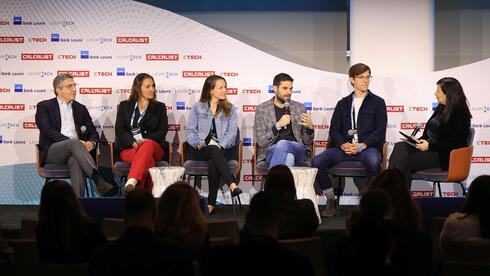
HR in War
“We've extended a hand to recruit workers from areas near Gaza.”
Glassbox has been working hard to keep operations under control as its workforce heads to the frontline.
“Human Resources plays an integral role in our business. Our involvement allows us to identify needs and gaps, facilitate connections within the company, and address both mental and business resilience,” explained Hila Amsalem VP of Global HR at Glassbox. “In this challenging time, HR's power shines through, even amid personal hardships. It is our duty to empower our teams as they work diligently to respond to organizational, business, and personal needs, all while bolstering their own resilience and that of our employees and managers.”
HR in War explores how companies in Israel are adapting in unusual times. CTech believes the world should know about the atrocities committed on 7/10 while also highlighting the continued resolve and resistance of the Israeli tech ecosystem.
“The current situation has underscored the strong bond between employees and managers across our global sites,” she continued. “Regardless of their location – be it in Israel, England, or the USA – or their background, all our employees are committed to the company's goals. This collective spirit inspires optimism and reinforces our belief that our business will continue to progress. We've also extended a hand to recruit workers from areas near Gaza and encouraged our employees to share information about relevant job opportunities with friends from the region.”
Company name: Glassbox
Your name and title: Hila Amsalem VP of Global HR
Names of founders and upper management: Yaron Morgenstern CEO, Yaron Gueta CTO, Hanan Blumstein CBO
Field of activity: Digital Customer Experiences
Number of employees: 300
Office location: Israel, UK, and USA
On a scale of 1-10, how much did the war disrupt operations at the company?
Four. As a global SaaS company, we are well-acquainted with operating within an uncertain ecosystem. At Glassbox, we are adept at responding swiftly to market fluctuations and have comprehensive pre-prepared action plans for various scenarios. Taking the COVID-19 pandemic as an example, we demonstrated agility in our approach. We provided training and tools to our managers and employees alike. Even in the face of recent challenges due to the ongoing conflict, our entire company swiftly mobilized, ensuring readiness at both the employee and business levels.
Our Israeli site, our largest, employs nearly half of our workforce. However, through strong teamwork and collaboration, our business continues to function seamlessly. Similarly, our teams in the USA and England promptly sprang into action, shouldering additional responsibilities. Both management and employees worked together to prioritize tasks, minimizing the impact on our operations. Nonetheless, we acknowledge the toll this has taken on morale, and as a company, we offer comprehensive support to our employees.
What consequences have you experienced from these disruptions?
In light of the current conflict and the abrupt conscription of approximately 5% of our workforce under Order 8 [an immediate order sent to IDF reservists during an emergency telling them to report], we recognize the challenges faced by employees whose spouses are now home caring for children without educational support. These difficulties, coupled with the emotional strain of the ongoing conflict, create additional obstacles. We've chosen to keep our offices open, allowing employees to work in a familiar and supportive environment. HR teams, senior management, and middle managers engage in ongoing conversations with every employee, enabling them to overcome these challenges and fostering an environment of trust and open communication.
What are the two major challenges you are coping with these days?
Resilience is one of the foremost challenges for our managers, who, as humans, must maintain personal resilience not only for themselves but also for their teams and colleagues. Encouraging experienced managers, who have weathered economic crises and work tirelessly, to prioritize their own well-being is a daunting task. The same challenge extends to our HR teams. I often liken it to the safety instructions on an airplane, where adults are advised to put on their oxygen masks before assisting children. Similarly, we must prioritize personal resilience to effectively support our colleagues.
In terms of our business continuity, especially if the current situation persists for several months, we must address this challenge. Our development center, along with a significant portion of our support team and managers, is based in Israel. We understand that some clients hesitate to open inquiries due to concerns for their employees' safety. Our challenge is to maintain open lines of personal and business communication, ensuring that no clients’ needs go unmet and that tasks are executed efficiently. We're also exploring how global teams can assist the Israeli site, and so far, these efforts have been successful.
What support do you provide to employees?
One of our initial actions, undertaken by both the HR team and management, was to contact each employee individually to assess their well-being and offer support. These conversations continue on a daily basis, allowing us to tailor our responses to the specific needs of each employee and their families. We've also conducted training sessions for managers and resilience workshops. Drawing from our experiences during the COVID-19 pandemic, we've made ongoing improvements to our remote work arrangements. We've equipped home workspaces, implemented enhanced communication methods and tools, and encouraged employees to maintain their daily routines. We support managers in maintaining daily routines and meetings, and we also provide funding for voluntary initiatives from both managers and employees. These initiatives include organizing meals for soldiers, purchasing personal equipment for them, and fulfilling personal requests, like sending a guitar to a soldier. There are also initiatives for collecting and packing clothes and donating computers to missing military personnel. Our ML experts collaborate with the army's abductees' headquarters, further strengthening our bonds with the community.
In addition to operational flexibility, adaptability in meeting goals, and performing tasks, the humanity and inclusiveness our company demonstrates towards its employees have proven to be the most significant factors. Employees truly appreciate our support, and they reciprocate this goodwill.
Do you have employees with foreign citizenship who asked to work from another country? If so, has movement been requested/approved?
As a global company with a site in the United States operating continuously from home, we allow digital nomadism for all our employees. During this challenging period, we've approved requests from employees to work as digital nomads. According to our policy, employees can work from anywhere in the world for a limited time each year, with compensation adjusted to the local currency.
How do you communicate the situation to customers? Do you see hostility or support?
We've been fortunate to experience not hostility but rather, overwhelming support. For example, one of our customers requested to donate to residents in the affected areas in a show of solidarity.
In the event employees feel they encounter hostility, how do you guide them to respond to the situation?
We maintain weekly conversations with our employees at global sites to explain the situation. While we face the challenge of conveying the local situation to our global teams, we've witnessed an incredible mobilization from them, eagerly taking on tasks from our Israeli site. For instance, our global marketing team has offered assistance to the employees conscripted under Order 8.
Startups only: How do you communicate the situation to investors, and how are they reacting?
Investment funds that support Israeli companies have a strong understanding of the situation, and we've encountered no issues with them. We've received messages from American funds investing in our company, indicating that they've made donations to organizations supporting communities from the south, as a gesture of solidarity towards our company.















